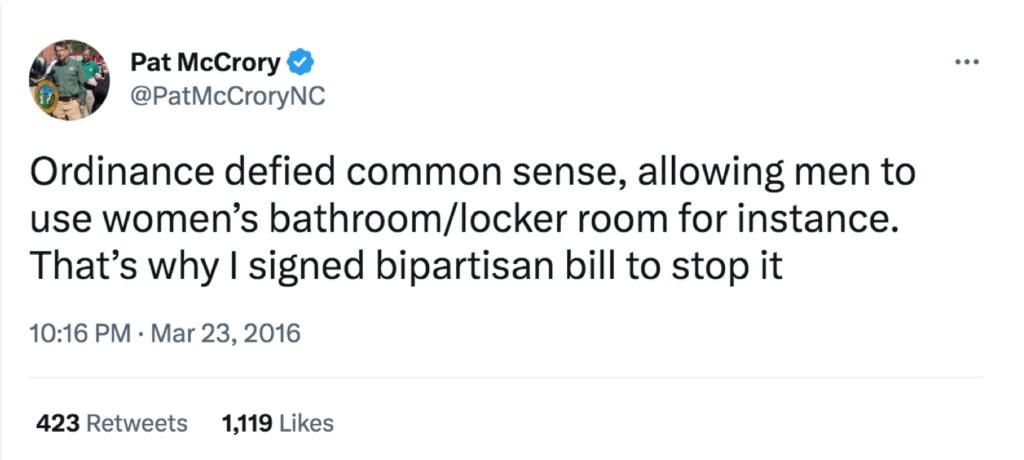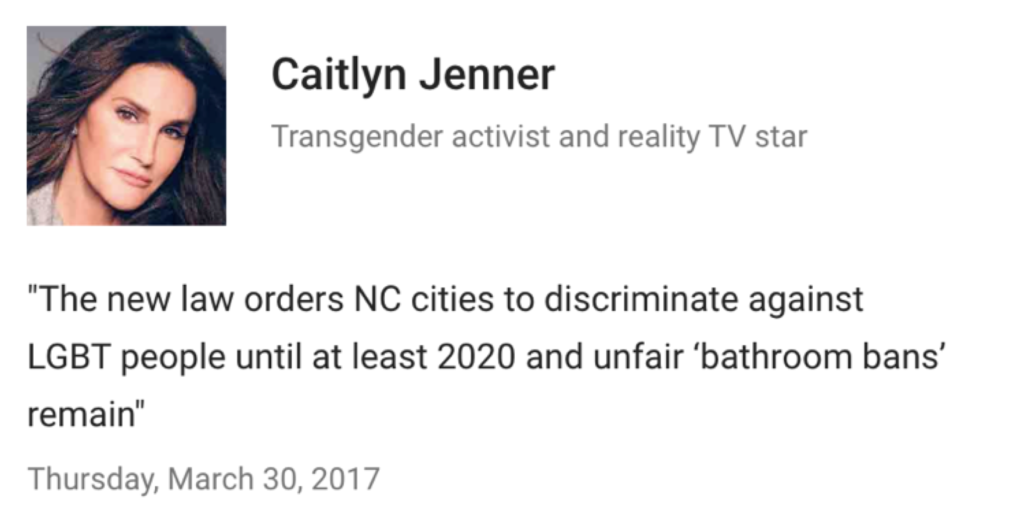How American Politics Are Causing Increased Attacks on the LGBTQ+ Community. Case Study: A Look Back at North Carolina’s Bathroom Bill


Forward
I was sad and angry to hear about the recent violent hate crime that occurred in a gender studies class at the University of Waterloo. I grew up in this town and I went to the University of Waterloo, and I could give you the usual line, “I never thought this could happen in my town,” but I won’t, because I’m not surprised. There has been an increase in hate discourse in North America over the last few years, particularly against the LGBTQ+ community, and particularly against transgender people within that group.
I recently wrote this essay about North Carolina’s bathroom law. When I was researching this essay, it helped me understand why American politicians seem to be increasingly attacking the LGBTQ+ community. I do not want to trivialize or minimize that there are many different causes for hate and bigotry, rather I want to highlight a specific driving force behind an increased hateful public discourse about the LGBTQ+ community. Although this essay focuses on a specific American case, there’s no doubt in my mind that American news, culture, and politics has contributed to increased hateful behaviour and discourse in Canada. Sometimes we pride ourselves on not being like our American neighbours, but for better or worse, we have a lot in common. Luckily Canadian politics have not descended into the terrifying state of affairs that we see south of the border.
I have noticed in the last few years that when I talk to people about these issues, there are plenty who buy in to the hot button fear issues and headlines about transgender people, especially in sports and schools. Their fears might be based off a headline they skimmed through on Facebook, a discussion they had with one of their friends, or by consuming online news. These moral panics are blown way out of proportion. As if transgender children and teachers are running a foul everywhere and destroying our society??? As if public bathrooms and change rooms are the venue of mass sexual assaults perpetrated by men dressed up as women!!! Really? I open my back door and I hear birds and crickets. Where is all the danger? Perhaps conservative politicians are picking on transgender people because they lost the same-sex marriage battle and now need to find a new target to rouse panic.
Hate towards the LGBTQ+ community has always existed, but why does it seem to be increasing? The essay below describes how conservative American political discourse has contributed to an increase in discriminatory sentiment towards the LGBTQ+ community, and transgender people in particular.
Republicans Use The LGBTQ+ Community to Gain Political Power
North Carolina’s HB2 (bathroom) bill, passed in 2016, was a moral panic instigated by Republican politicians to drive conservative-voting Evangelicals to the ballot box. Conservative political victories, assisted by religious voters, allow libertarians to push their national agenda of deregulation, less government oversight, and more “economic freedom”. The swing state’s bathroom law was driven and fuelled by 1) Republican politicians, in order to gain and maintain political power, 2) conservative media for the purpose of amplifying and panicking voters, and 3) by special-interest groups such as the Koch Donor Network and Evangelical Christian voters.
On March 23, 2016, North Carolina Governor Pat McCrory signed Bill HB2 into law, requiring transgender people to use the public restroom matching the sex on their birth certificates. The bill was a response to an LGBTQ+ anti-discrimination ordinance that had been passed in Charlotte, North Carolina (Wikipedia, 2018). Governor McCrory tweeted that day, “Ordinance defied common sense, allowing men to use women’s bathroom/locker room for instance. That’s why I signed a bipartisan bill to stop it” (McCrory, 2016). Proponents of the bill claimed concerns related to bathroom privacy, the safety of women from men committing sexual crimes in bathrooms, and problems arising from boys being allowed in school change rooms and showers with girls (Brown, 2016). Although the majority of legislators in the state agreed with the governor’s actions, there was a significant backlash against the law locally, nationally, internationally, and also from the corporate world. Dozens of organizations, including the NBA, the NCAA, Bloomberg, Capital One, Williams-Sonoma, and PayPal, threatened to relocate their events and offices to other states in protest against what they considered to be a state-sanctioned discrimination (Silva, 2017). Touring musicians also began boycotting the state, with dozens of acts cancelling concerts or devoting portions of North Carolina concert proceeds to LGBTQ+ community organizations. It was projected that the state could lose up to 3.7 billion dollars over the next decade as a result of the law (Silva, 2017). After North Carolina pre-emptively sued the U.S. Department of Justice when it signalled it would take measures to block the law, the DOJ followed through and filed a federal lawsuit citing the bill’s restroom restriction as “impermissibly discriminatory” (NPR, 2016).

Despite the backlash, the North Carolina governor stood by his decision. In interviews with the media, and in press statements, McCrory blamed Democrats for starting the fight and also used evasive language and contradiction, arguing it was not discriminatory, rather protective. On NBC News he said, “this was government overreach,” “it was the left that brought about the bathroom bill, not the right, in the city of Charlotte” and we need to “have these discussions of the complexity of equality while also balancing the concept of privacy, including privacy in the most private areas of our life, which is a restroom, locker room, or shower facility in our high schools” (NBC News, 2016).
McCrory and other proponents of the bill often evade the question of discrimination by inferring they are simply looking to protect women and children against men in public spaces. This type of language is likely convincing to many religious and conservative voters because it does not directly use discriminatory language or overt aggression towards the LGBTQ+ community. Supporters of the bill seem to exaggerate their arguments by constantly suggesting “men” would be in the “girls” bathroom. Supporters of the bill also refer to woman as “girls” suggesting they are helpless against the threat of grown men entering these spaces, when in many cases it is younger people using these public spaces. The North Carolina governor also contradicts himself when he argues for protecting “the concept of privacy, including privacy in the most private of areas of our lives.” He biasedly makes this claim for the welfare of heterosexual or cis students while completely disregarding the “most private areas of life” for LGBTQ+ people. He further contradicts himself when he cites the city of Charlotte’s anti-discrimination ordinance as an example of government overreach, even though he and the state of North Carolina overreached when they over-ruled it.
As the backlash continued, on August 26th, 2016, a US District Court judge granted an injunction that would block the University of North Carolina from enforcing the bill (CNN, 2016). On December 5th, 2016, Governor Pat McCrory lost his re-election bid to Democrat Roy Cooper. Governor Cooper, who ran on a platform to repeal the bill, did so on March 30th, 2017 (Smith, 2017). The LGBTQ+ community were dissatisfied with the compromises in the repealed bill. The repeal made some address regarding discriminatory bias in the workplace, housing, and other public accommodations, but it still left local regulation of public bathrooms and changing facilities within state legislature authority (Marr, 2010). The compromised Bill 142 also put a temporary halt on local governments passing non-discriminatory ordinances until 2020 (Silva, 2017). LGBTQ+ advocates felt sold out by the new governor, arguing the repealed bill allowed for the same discrimination to continue until 2020. Many felt Governor Cooper was more concerned with the economic damages caused by the bill than helping the LGBTQ+ community fight discrimination. On the day the new bill was signed the Democratic governor of North Carolina said, “it’s not a perfect deal, but it repeals House Bill 2 and begins to repair our reputation” (Smith, 2017).
“TWO THIRDS OF AMERICANS OPPOSE BILLS LIMITING THE RIGHTS OF TRANSGENDER PEOPLE” -PBS
One might ask – what is going on here? Why did the governor sell out? Understanding the political structure and history of North Carolina will provide context surrounding the outcome of the repealed law. It’s not actually the case that Roy Cooper sold out, rather he is a minority Democratic governor that has to work with a Republican dominant state legislature. From the 1990s to around 2010, North Carolina was predominantly democratic in the senate, the house, and the governorship. Around 2011, Republicans began to dominate in the house and senate, while Democrats were often elected governor (Ballotpedia, n.d).

In North Carolina, and many other U.S. states, there tends to be more cultural and demographic diversity in the larger cities than in rural areas. Larger city centre populations tend to vote democratic, where rural voters often lean republican (Maxwell, 2019).The dramatic shift of party control from Democratic to Republican in North Carolina is a result of a decade long gerrymandering campaign (Beauchamp, 2021). Republicans have successfully redrawn the district lines for house elections so that rural areas can amass more seats than the city centres, despite city centres having higher populations. This shifts legislative power away from the majority, whom often live in city centres and vote democratic, to the minority rural republican voters. Although governors have power to veto some laws, they do not have the power to veto district map changes for house elections in North Carolina.
According to a 2021 poll by PBS NewsHour, two thirds of Americans oppose bills limiting the rights of transgender people (PBS, 2022). So, if arguably the majority of North Carolinians were not in support of the bathroom bill, why did Republican state legislators still uphold many aspects of the original bill in the repeal? Evangelical voters. 35% of adults in North Carolina are Evangelical (Pew Research Centre, n.d.). Evangelical voters tend to align with Republican candidates (Lee & Hayes, 2020). In North Carolina, Republican legislators rely on the Evangelical vote to win seats. Also, because the country is so evenly divided politically, a swing state like North Carolina is vital on the national level, to both the Republican and Democratic Parties.
Once the bill and its repeal expired in 2020, it allowed for cities to pass non-discrimination ordinances related to work and public accommodations such as hotels and ride shares (Millington, 2020). In 2021, 16 North Carolina cities passed non-discrimination ordinances, some of which included the new addition of the terms “gender identity” and “gender expression.” Although some gains were made regarding bias in the workplace, housing, and other public accommodations, the regulation of public bathrooms and changing facilities remains within the state legislature’s authority (Marr, 2021). In 2020, transgender North Carolinians still had “no affirmative legal right to use bathrooms corresponding with their gender in many places, including restaurants and local businesses” (Heyward, 2020).
“Since 2020, 15 states have passed laws barring transgender kids from playing sports in their lived genders. Three have put laws on the books to prevent trans kids from accessing care for gender dysphoria and have outlawed mention of LGBTQ+ history or people for young kids in public schools” (PBS, 2022). Conservative politicians continue to attack the LGBTQ+ community in a quest to maintain the Evangelical vote, but they don’t do it alone, they get plenty of help from conservative media.
The Online Conservative Media Infrastructure is More Effective Than Left-Leaning Media
When I started to research media outlets in North Carolina I found the majority of the large daily newspapers leaned left of centre. Newspapers such as the Charlotte Observer, The News & Observer, Winston-Salem Journal, and The Fayetteville Observer certainly covered the story, but there wasn’t much evidence of fear-mongering or support for the state’s bathroom bills (Agility, 2020). I searched online for local television news reports on the topic and found the coverage of the stories fair and balanced. Journalists reported the facts, and also included concerns from those who opposed and supported the bills. The journalists never included opinion or insinuation of any type in their reports. North Carolina’s largest TV news outlets include WUVC-TV in Raleigh with a viewership of 39,549,032, WRAL-TV in Raleigh with a viewership of 10,362,508, and WGHP-TV in High Point with 4,032,300 (Mills, 2017). The majority of the major news outlets in North Carolina did not seem to be fanning the flames of the bathroom bill moral panic.
Although I was a little surprised to find that the vast majority of major media outlets in North Carolina lean left of centre, I was not surprised to find out that Fox News has a major influence, nationally and locally, all over the United States. My suspicion was, perhaps those in North Carolina who supported the bathroom bill were getting a lot of their information about the topic from Fox News. Upon looking further into how Fox Network covers stories related to LGBTQ+ and transgender issues, I found many examples of panic and opinion coming from TV hosts and reporters. Commentary around the topic of transgendered people on Fox TV programs included statements such as, “parents will have to start worrying about boys showering with girls,” “what do we do with the 7-year-old girl an there’s a 14-year-old boy naked in the girls locker room because that’s where he chooses to be,” “The girls want to go to the boys bathroom and the boys want to go into the girls bathroom, and they can just say oh I was just transgender for the moment,” and “ So if a boy wakes up and says I’m really feeling my girl side today he gets to go shower with the girls”(Transgender Law Center, 2013).
Pat Buchanan, the long-time conservative and former presidential candidate, went on Fox News and said, “the idea that grown men have a right to use girls’ locker rooms and girls’ bathrooms and all the rest of it seems to me is ridiculous. There is no need, there is no great crisis in America” (Media Matters for America, 2016). Again, we see gross exaggeration and fear-mongering when Buchanan refers to all males as “men” and females as “girls”. Similar to Governor Pat McCrory, Buchanan suggests Democrats manufactured the moral panic, when in fact it was the Republican governor who initiated the controversy by striking down anti-discrimination ordinances in Charlotte.
Although much of the local news outlets were not broadcasting content with comments like Fox, it is likely that many conservatives in the state were viewing this type of material on national media broadcasts, rather than local. In fact, the influence of the right-leaning Fox News organization in the United States has grown significantly over the last decade. At the same time, left-leaning CNN has lost many viewers in recent years. In February 2023 CNN had its lowest rating month in a decade, down 42% among primetime viewers. Fox’s prime time viewership sits at 2.26 million, MSNBC’s at 1.16 million, and CNN’s at 587,000. Fox News had 94 of the 100 most watched telecasts in February (Forbes, 2023). According to Vice News (2019), Fox News also dominates on social media, beating out CNN, ABC, NBC, and The New York Times on Facebook page engagements.
According to Mills (2017), there is a growing conservative media infrastructure online that is more sophisticated and effective than left-leaning media. He explains that in the 1980s and 1990s, when conservative radio got really popular, Fox News came along and helped transform conservative radio for television. Democrats neglected to build a media network that was particularly aligned with their party. Rather, they focused on building donor networks such as Progress Now to rival conservative donor networks like The Koch Network. With powerful online news outlets such as The Carolina Journal, North State Journal, Breitbart and Vox, the conservative news network was able to establish an alternative to mainstream media (Mills, 2017). This marks an important difference between the effectiveness conservative media messaging has on its audience compared to democratic or left-leaning media.
With headlines such as “North Carolina Governor Pat McCrory’s Defeat Due to Radical Forces and Corporate Extortion, Bullying” in Breitbart (2016), and “Leave Them Kids Alone” by the Washington Free Beacon (2023), conservative online media has convinced much of their viewers that corporate powers and interference fuelled the backlash against the bathroom bill, rather than discrimination issues. The conservative media news network has been more effective in influencing Republican politics because it is more closely aligned with the party. Some of the main themes surrounding North Carolina’s bathroom bill, as delivered by different conservative media, focused on themes that scared parents about girls’ safety and privacy from men and boys in bathrooms, locker rooms, and showers. Democrats were portrayed as bullying conservatives into accepting “woke” liberal values. Democrats were also portrayed as overreaching into what are considered moral and private personal decisions and values. So, what is the purpose of these types of news stories and reporting? Well, you could look at Evangelicals as a special interest group, or you could see them as being used by conservative politicians and donors to achieve their political aims, which is to win seats in elections for the purpose of advancing their libertarian views of less government oversight, less corporate regulation, and more “economic freedom.”

Pandering to the Religious Right Is A Driving Force For LGBTQ+ Abuse
So who are these Evangelicals that Republican politicians rely on to win elections? In North Carolina, the language of local religious figures mirrored the language of conservative politicians and media. Rev. Mark Creech, executive director of the Christian Action League of North Carolina said on WRAL News, “it’s unfortunate that Hollywood celebrities, corporations and sports groups fail to really understand what’s in the bill. That smear campaign has resulted in unfounded criticisms of the law,” and Ron Baity, pastor of Berean Baptist Church in Winston-Salem said, “we want lawmakers to understand that there’s more for them than is against them,” (WRAL News, 2016).
Since the 1980s, Evangelicals have become an important part of the Republican vote. According to a CNN poll, 38% of the North Carolina electorate in 2016 were Evangelical and one in four Americans in 2014 were Evangelical (Husser, 2020). Husser (2020) explains that Evangelicals attend church more consistently, with 64% attending weekly, compared to 35% for other Christian groups in the United States. This suggests that “moral issues” are particularly important for a large portion of North Carolina voters. In fact, moral issues often matter more to Evangelical voters than other issues. In a 2022 survey conducted by Neighbourly Faith, when asked how important certain issues are in the way they vote, Evangelicals between the ages of 18 to 25 were more concerned with issues such as terrorism, gun policies, racial issues, taxes, abortion, and LGBTQ+ issues over economic issues (Burge, 2023). The Republican Party needs Evangelical votes because they often have the same views regarding healthcare, the economy, immigration, abortion, gun control, and the environment (Husser, 2020). So, although America’s Religious Right can certainly be seen as a special interest group related to North Carolina’s bathroom bill, I see the group more as being used by the more sophisticated and calculated special interest group, the Koch Donor Network.
The Koch Donor Network is a group of far-right multi-millionaires and billionaires such as Robert Mercer, Foster Friess, Richard DeVos, John Templeton Jr., and of course Charles Koch. Motivated by socialist fears, capitalism advocacy, and economic liberty, the Koch Network’s wealthy donors fund a vast network of publications and student activist groups around the country (Wilson & Kamola, 2021). The donor network aims to create moral outrage against the left, who are supposedly messing with conservative family values, to whip up conservative voters, who often vote “morally” and end up supporting the Republican Party.
Wilson & Kamola (2021) explain that the Koch Donor Network wants to push back against civil rights, workers’ rights, and anti-discrimination rights because they favour laws that decrease government oversight of any type. Workers’ rights and anti-discrimination laws take power away from corporate managers and wealthy people. The Koch Donor Network uses moral panics to gain political influence in order to change or adapt laws to favour the wealthy. Over the last few decades, whipping up moral panics around subjects related to race, same-sex marriage, abortion, and now LGBTQ+ issues, the conservative donor network has successfully influenced how laws are changed and written. The Koch Donor Network has achieved this by helping Republicans win votes, but also through helping religious and libertarian conservative candidates win elections.
In 2023, Politicians Continue to Attack the Rights of those in the LGBTQ+ Community
North Carolina’s bathroom law was driven and fueled by 1) Republican politicians, in order to gain and maintain political power, 2) conservative media for the purpose of amplifying and panicking voters, and 3) by special-interest groups such as the Koch Donor Network and Evangelical Christians. Although two thirds of Americans do not support bills limiting the rights of transgender people, anti-LGBTQ+ policies are still being passed. Since 2020, three states have passed laws to prevent trans kids from getting care for gender dysphoria and two states have outlawed mention of LGBTQ+ history or prominent figures in public schools (PBS, 2022).
Although he lost the general election in 2020, Trump did get the Evangelical vote. Biden was able to win because he also earned some of the Christian religious votes, plus independents (Newport, 2020). In Florida, Governor Ron Desantis has gained significant political power through his attacks on African Americans, schools, businesses, and the LGBTQ+ community. It remains to be seen if the Evangelicals will support him or Trump, and if their votes will be enough to help the Republicans win in the 2024 general election. Will attacking the LGBTQ+ community work for conservatives, or will it backfire like it did for Governor McCrory?
References
Avery, D. (2020, Dec 8). NBC NEWS LGBTQ rights fight reignited 4 years after N.C.’s ‘bathroom bill’ controversy. NBC News. https://www.nbcnews.com/feature/nbc-out/lgbtq-rights-fight-reignited-4-years-after-n-c-s-n1250390
Bathroom Bill. (2018, May). In Wikipedia. https://en.wikipedia.org/wiki/Bathroom_bill
Beauchamp, Z. (2021, Nov 9). North Carolina’s extreme new gerrymander, explained. Vox. https://www.vox.com/policy-and-politics/2021/11/9/22765982/north-carolina-redistricting-gerrymandering-2021-2022
Berry, S. (2016, Dec 6). North Carolina Gov. Pat McCrory’s Defeat Due to ‘Radical Forces’ and ‘Corporate Extortion, Bullying’. Breitbart News. https://www.breitbart.com/politics/2016/12/06/north-carolina-gov-pat-mccrorys-defeat-due-to-radical-forces-and-corporate-extortion-bullying/
Blad, E. (2016, May 17). Schools at Center of Feud Over N.C. Transgender Law. Education Week.org. https://www.edweek.org/policy-politics/schools-at-center-of-feud-over-n-c-transgender-law/2016/05
Blazina, C. & Baronavski, C. (2022, Sept 15). How Americans view policy proposals on transgender and gender identity issues, and where such policies exist. Pew Research Center. https://www.pewresearch.org/fact-tank/2022/09/15/how-americans-view-policy-proposals-on-transgender-and-gender-identity-issues-and-where-such-policies-exist/
Brown, K. (2016, April 11). ‘Bathroom bill’ backers rally at Capitol. WRAL News. https://www.wral.com/-bathroom-bill-backers-rally-at-capitol/15635714/
Burge, R. (2023, Jan 17). The Concerns of Young Evangelicals Offer Political Insights for 2024. Religion & Politics. https://religionandpolitics.org/2023/01/17/the-concerns-of-young-evangelicals-offer-political-insights-for-2024/
Chart. (n.d.). Evangelical Protestants by State. % of adults in each state who are Evangelical Protestant. Pew Research Center. https://www.pewresearch.org/religion/religious-landscape-study/religious-tradition/evangelical-protestant/
CNN. (2016, May 11). North Carolina Gov. Pat McCrory blames Democrats for ‘bathroom bill’. [Video]. https://www.cnn.com/2016/05/11/politics/north-carolina-pat-mccrory-bathroom-bill-the-lead/index.html
De Vogue, A. (2016, Aug 26). Judge blocks UNC from enforcing ‘bathroom bill’ against 3 plaintiffs. CNN. https://www.cnn.com/2016/08/26/politics/north-carolina-transgender-lgbt/index.html
Fox News. (2016, Dec 22). North Carolina Senate defeats bid to repeal controversial ‘bathroom bill’. [Video]. https://www.foxnews.com/politics/north-carolina-senate-defeats-bid-to-repeal-controversial-bathroom-bill
Gjelten, T. (2020, Nov 8). 2020 Faith Vote Reflects 2016 Patterns. NPR. https://www.npr.org/2020/11/08/932263516/2020-faith-vote-reflects-2016-patterns
Green, C. (2022, Feb 17). How to Decipher Propaganda. Liberal Currents. https://www.liberalcurrents.com/how-to-decipher-propaganda/
Hayes, A. & Lee, C. (2020, Nov 2). Fight for evangelical voters could be crucial in North Carolina. NBC News. https://www.nbcnews.com/politics/2020-election/fight-evangelical-voters-could-be-crucial-north-carolina-n1245746
Heyward, G. (2020, Dec 21). A New Day for Queer People in the South. The Atlantic. https://www.theatlantic.com/politics/archive/2020/12/lgbtq-north-carolina-bathroom-bill-hb142/617243/
Hobbes, M. (2021, Oct 21). The Methods of Moral Panic Journalism. michaelhobbes.substack.com. https://michaelhobbes.substack.com/p/moral-panic-journalism
Holmes, K. (2023, Jan 19). Trump criticizes evangelical leaders for not backing his 2024 presidential bid CNN.https://www.cnn.com/2023/01/18/politics/donald-trump-evangelicals-2024/index.html
Husser, J. (2020, April 6). Why Trump is reliant on white evangelicals. Brookings. https://www.brookings.edu/blog/fixgov/2020/04/06/why-trump-is-reliant-on-white-evangelicals/
Iafolla, R. (2022, Aug 18). Transgender Workers’ Rights Expanded by Gender Dysphoria Ruling. Bloomberg Law. https://news.bloomberglaw.com/daily-labor-report/transgender-workers-rights-expanded-by-gender-dysphoria-ruling
Jacobs, F. (2019, May 22). Maps show how CNN lost America to Fox News. Big Think. https://bigthink.com/strange-maps/cnn-fox-news/
John, E. (2016, May 17). North Carolina governor’s ignorance of trans identity. The Hill. https://thehill.com/blogs/congress-blog/civil-rights/279995-north-carolina-governors-ignorance-of-trans-identity/
Joyella, M. (2023, Feb 28). CNN Hits 10-Year Low As Fox News Glides To Victory In Cable News Ratings. Forbes. https://www.forbes.com/sites/markjoyella/2023/02/28/cnn-hits-10-year-low-in-prime-time-as-fox-news-glides-to-victory-in-february-cable-news-ratings/?sh=51db17807d09
Kralik, J. (2019, October 24). Bathroom Bill Legislative Tracking. National Conference of State Legislators. https://www.ncsl.org/education/bathroom-bill-legislative-tracking#:~:text=2017%20State%20Legislation,birth%20or%20%E2%80%9Cbiological%20sex.%22
List of North Carolina Governors. (n.d.). In Wikipedia. https://en.wikipedia.org/wiki/List_of_governors_of_North_Carolina
List. (2022, July). Top 10 newspapers were Left leaning. Agility PR. https://www.agilitypr.com/resources/top-media-outlets/top-10-north-carolina-daily-newspapers-by-circulation/
Lupfer, J. (2023, March 8). When it comes to 2024, do evangelical Christians matter? Religion News Service. https://religionnews.com/2023/03/08/when-it-comes-to-2024-do-evangelical-christians-matter/
Mar, C. (2021 Nov 22). North Carolina Anti-Bias Laws Sprout as ‘Bathroom Bill’ Era Ends. Bloomberg Law. https://news.bloomberglaw.com/daily-labor-report/north-carolina-anti-bias-laws-sprout-as-bathroom-bill-era-ends
Maxwell, R. (2019, March 5). Why are urban and rural areas so politically divided? The Washington Post. https://www.washingtonpost.com/politics/2019/03/05/why-are-urban-rural-areas-so-politically-divided/
Media Matters for America. (2016, May 9). Pat Buchanan on Fox News: “The Minority That Is Griping” About NC Bathroom Bill Should “Simply Deal With It. [Video]. https://www.mediamatters.org/fox-nation/pat-buchanan-fox-news-minority-griping-about-nc-bathroom-bill-should-simply-deal-it
Millington, M. (2020, Dec 3). HB2 is Officially Dead and Gone in NC. Here’s Why That Matters. Cardinal & Pine. https://cardinalpine.com/story/hb2-is-officially-dead-and-gone-in-nc-heres-why-that-matters/
Mills, T. (2017, July 28). The Growing Conservative Media Infrastructure. Politics North Carolina. https://www.politicsnc.com/the-growing-conservative-media-infrastructure/
NBC News. (2016, April 18). Pat McCrory: Government Shouldn’t Be HR In Private Businesses. [Video]. https://www.youtube.com/watch?v=PuWghA_zNrI
Nester, A. (2023, March 12). Leave Them Kids Alone. Washington Free Beacon. https://freebeacon.com/campus/leave-them-kids-alone/
Newport, F. (2020, Nov 13). Religious Group Voting and the 2020 Election. Gallup. https://news.gallup.com/opinion/polling-matters/324410/religious-group-voting-2020-election.aspx
North Carolina House of Representatives. In Ballotpedia.(n.d.). https://ballotpedia.org/North_Carolina_House_of_Representatives
NPR. (2017, Feb 27). Ex-N.C. Gov. Pat McCrory Offers His Take On Transgender Rights [Radio Interview]. https://www.npr.org/2017/02/27/517458876/ex-n-c-gov-pat-mccrory-offers-his-take-on-transgender-rights
Office of Governor Pat McCrory (2016, April 12). North Carolina governor says he wants bathroom law partially changed after backlash. [Video]. https://www.washingtonpost.com/news/post-nation/wp/2016/04/12/deutsche-bank-halts-north-carolina-expansion-due-to-transgender-bathroom-law/
Pat McCrory, P.M. [@PatMcCroryNC]. (2016, March 23). Ordinance defied common sense, allowing men to use women’s barthroom/lockerroom for instance. That’s why I signed a bipartisan bill to stop it. [Tweet]. Twitter. https://twitter.com/PatMcCroryNC
Pearce, M. (2016, Feb 24). Conservatives push back on transgender bathroom rights in North Carolina. Baltimore Sun. https://www.baltimoresun.com/la-na-0224-transgender-battleground-20160224-story.html
Politico Staff. (2016, May 9). DOJ sues North Carolina over transgender bathroom bill. Politico. https://www.politico.com/story/2016/05/doj-sues-north-carolina-over-transgender-bathroom-bill-222979
Roach, D. (2016, Nov 15). Restroom law likely safe despite N.C. election saga. Baptist Press. https://www.baptistpress.com/resource-library/news/restroom-law-likely-safe-despite-n-c-election-saga/
Shamlian J. & Schuppe, J. (2016, March 28). North Carolina Gov. Pat McCrory Calls LGBT Criticism ‘Political Theater’ NBC News. https://www.nbcnews.com/news/us-news/north-carolina-gov-pat-mccrory-calls-lgbt-criticism-political-theater-n546846
Silva, D. (2017, March 30). HB2 Repeal: North Carolina Overturns Controversial ‘Bathroom Bill’. NBC News. https://www.nbcnews.com/news/us-news/hb2-repeal-north-carolina-legislature-votes-overturn-controversial-bathroom-bill-n740546
Smith, A. (2017, March 29). North Carolina Lawmakers Announce Deal to Repeal ‘Bathroom Bill’. NBC News. https://www.nbcnews.com/news/us-news/north-carolina-lawmakers-announce-deal-repeal-bathroom-bill-n740401
Sosin, K. (2022, May 20). Why is the GOP escalating attacks on trans rights? Experts say the goal is to make sure evangelicals vote. PBS.org. https://www.pbs.org/newshour/politics/why-is-the-gop-escalating-attacks-on-trans-rights-experts-say-the-goal-is-to-make-sure-evangelicals-vote
Transgender Law Center (2013, August 23). Compilation of Fox News Attacks on Transgender Youth [Video]. https://transgenderlawcenter.org/archives/8900
Uberti, D. (2019, April 29). How Fox News dominates Facebook in the Trump era. Vice News. https://www.vice.com/en/article/wjvdem/how-fox-news-dominates-facebook-in-the-trump-era
Wagner, L. (2016, May 9). North Carolina Sues DOJ Over LGBT Law; DOJ Sues Back. NPR. https://www.npr.org/sections/thetwo-way/2016/05/09/477316001/deadline-approaches-for-north-carolinas-response-on-lgbt-law
Wilson, Ralph and Isaac Kamola (2021) Free Speech and Koch Money: Manufacturing a Campus Culture War. London and New York: Pluto Press.
Wood, O. & Landers, R. (2023 February 22). The Unprecedented Attack on Trans Rights. Left Voice. https://www.leftvoice.org/the-unprecedented-attack-on-trans-rights/